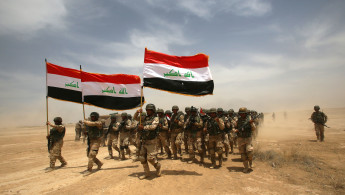Iraqi parliament postpones controversial bill for compulsory military conscription
Iraq is considering reinstating compulsory military service for the first time since the 2003 US-led invasion of the country as the country currently is experiencing high unemployment rates among the younger population and faces numerous security challenges.
The Iraqi parliament on Sunday adjourned the first reading of the controversial conscription bill until the parliament's next session to offer more time for the different political blocs to reach a consensus before discussing it in the legislature, according to a statement by the parliament.
Mandatory service in the Iraqi armed forces was introduced in 1935 up until 2003 when voluntary military service was adopted after the toppling of the former regime of Saddam Hussein.
Iraq has nearly one million armed forces, ranging from the regular army, anti-terror forces, local and federal police, security, intelligence, border guards, Popular Mobilization Forces, and the Peshmerga forces of the northern Kurdistan region.
Since Saddam's overthrow, Iraq has suffered a sectarian conflict that culminated in the Islamic State (IS) group seizing large swathes of territory, before its defeat in late 2017 by Iraqi forces backed by a US-led military coalition.
According to the bill, published online by Iraqi media outlets and seen by The New Arab, conscription includes young men aged 18 to 35 and will span between three and 18 months according to their education level. Only sons and breadwinners are exempted from military service.
Individuals under 50 will also be conscripted in the military reserve services. Young soldiers would be paid allowances from 600,000 to 700,000 Iraqi dinars (nearly US$480). Paying cash instead of military service will also be an option. Two years after the passing of the law, Iraq would fully restore conscription, but it would cost the state two trillion Iraqi dinars per year.
"The bill has been proposed by the former government of Mustafa al-Kadhimi and needs further contemplation as it contains many items that are not consistent with the realities in Iraq," Sakfan Sindi, the deputy head of parliament's security and defence committee from the Kurdistan Democratic Party (KDP), said to TNA in a brief phone call.
"As per demands by several lawmakers, reading the bill at the parliament has been postponed. If the bill is passed by the parliament, it would need a large budget that the Iraqi state currently cannot cover," he added.
He indicated that the bill is "far away from the realities on the ground in the country, as it includes the Iraqi Kurdistan region that has its Peshmerga forces and 'has its peculiarity.'"
"I think the bill could not be passed, and even passed it cannot be put into implementation over the next ten years," he mused.
إنَّ المضي بتشريع قانون "خدمة العلم" يضمن إعداد جيلٍ من الشباب أكثر قدرة على مواجهة مصاعب الحياة، مُلِمٍّ بالحقوق والواجبات، ومتحفِّز لحفظ الدولة وسيادتها، ويسهم في تعزيز منظومة القيم والأخلاق والانضباط والالتزام بالهُوية الوطنية.
— محمد الحلبوسي (@AlHaLboosii) November 3, 2022
For his part, Iraq's parliament Sunni speaker, Mohammed al-Halbusi, on 3 November tweeted, "Working to pass serving the flag bill will guarantee the preparation of a generation of youth who are more capable of facing life's hardships, adherent to rights and duties, resolvent to protect the state and its sovereignty, and will participate in reinforcing the disciplines of values, morals, regulations and adherence to the national identity."
لن أناقش جدلية #التجنيد_الإلزامي فقد أُشبع نقاشاً وانتُقد من مجمل الأوساط العراقية في بيان سلبياته خصوصاً في موضوع عسكرة المجتمع. لكن هل يعلم مجلس النواب أن هذا القانون سيمنع الفرد العراقي من استحصال فيزة للدول الغربية التي تحظر كل مَن تدرب على السلاح في بلدان كانت حاضنة للإرهاب؟
— Luay al-Khatteeb لؤي الخطيب (@AL_Khatteeb) November 4, 2022
Meanwhile, Iraqis on social media and on the streets are divided over the bill. TNA spoke with several Kurds in the Kurdistan region and inquired about their opinions on the bill. Some said they are against conscription in Iraq and argued voluntary military service is the best option. Others, however, said conscription is a good step for the time being as thousands of unemployed and desperate people would join the army.
"We see many people in Iraq commit suicide due to poverty, or risks with their lives in the sea to reach Europe; moreover, youths now need partisan backing to voluntarily join the armed forces," a Kurdish man, speaking on condition of anonymity, told TNA.
"If there is conscription those desperate and unemployed youths would find serving their country is better than starvation, sitting idle, or risking to go abroad," he added.
Former electricity minister Louai al-Khatib tweeted that the bill if for the 'militarisation' of the Iraqi society and make it harder for any Iraqi to get a visa to western countries as those countries are banning people who've had military training in countries seen as 'haven for terrorism.'





 Follow the Middle East's top stories in English at The New Arab on Google News
Follow the Middle East's top stories in English at The New Arab on Google News


